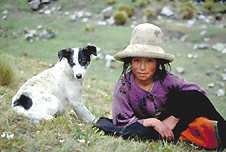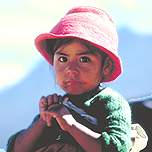Beauty and No Beasts
| "Now I’m almost getting peak-fatigue," said Tom. Though we knew he was
joking, we looked at him with disapproval. After missing out on most of the spectacular
peak views the first few days of the trek because of some rain and overcast skies, the
weather had finally turned into the "marvelous sunny days" as promised in the
trip itinerary. We were standing at the top of the Caracara Pass at 15,800 feet and were
surrounded by snowcapped peaks: Tayapampa (18,560’) and Jancarurish (18,301’) to
the left, Quintaraju (19,804’), Purmapampa (18,981’), and the three Santa Cruz
Mountain peaks (all above 19,000’) to the right. Behind us we had Pilanco (17,3001)
and in front us our first views of spectacular Alpamayo (19,511’). From the pass you can only see the very top of Alpamayo, but the farther you get down into the Jancarurish Valley, the more you see of the mountain and lakes below it. The clouds were moving in from the west – threatening to cover Alpamayo’s peak – and even though we had just reached the pass I was eager to move on to get the full view. Victorino, our amazing 70-year-old local guide, agreed to start the descent with me. Racing the clouds, I practically ran down the switchbacks. At every turn the view just kept getting better. I could see more of the mountain, the glacier, and the two lakes below – one light turquoise blue, the other dark green. |
|
Just before we reached the valley floor, we stopped and sat, waiting for the rest of the group. This was the moment I most anticipated since I had signed on with this trek: the view of Alpamayo. Sitting here gazing at its bright white and perfect pyramid-shaped peak against a clear blue sky, the cascading light blue glacier, and the lakes at its foot, it was easy to understand why it has been voted the most beautiful mountain in the world. If you get peak-fatigue in the Cordillera Blanca, it’s only because no human can hold so much beauty at once.
I had wanted to go to Cordillera Blanca because of the peaks. What I hadn’t paid attention to until we’d arrived were the valleys. On the trek we crossed seven passes and each pass led into a new and breathtaking valley. I didn’t know there were so many different shades of green, or so many beautiful, colorful flowers endemic to the Andes and the Cordillera Blanca. The valleys were dotted with cattle, horses, sheep, and pigs peacefully grazing along the pre-Inca trail we followed through the mountain range.
|
Some of the valleys had small villages, some had only one or a few farmhouses, and some were uninhabited, almost untouched. Most nights we camped at the bottom of a valley, and no matter how or where we put our tent, we would have "a room with a view." Best of all, besides the charming local people and meeting a few trek groups towards the end of our journey, we had the entire area to ourselves.
|
 |
 |
Apparently, the Cordillera Blanca is not only a scenic rival to the Himalayas; it is also one of the world’s best-kept secrets.
Article and Photos by
Camilla Hvalsoe
Camilla Hvalsoe, a native of Denmark, is Mountain Travel Sobek's Internet Marketing Manager.
| [Mountain Travel Sobek’s "Trekking in the Cordillera
Blanca" adventure is in one of the most stunning ranges of the Andes. Here
there are more than 40 mountains over 19,000 feet high, linked by pretty valleys laced
with ancient trading routes. This challenging trek in the Cordillera Blanca goes through
the heart of the dazzling glacial mountain environs of Huascarán National Park, enjoying
an alpine wonderland of pretty wildflowers, cultivated farmlands, and colorful villages of
campesinos, hardy descendants of the ancient Incas]. Click here for more information on this adventure. Mountain Travel Sobek U.S. |